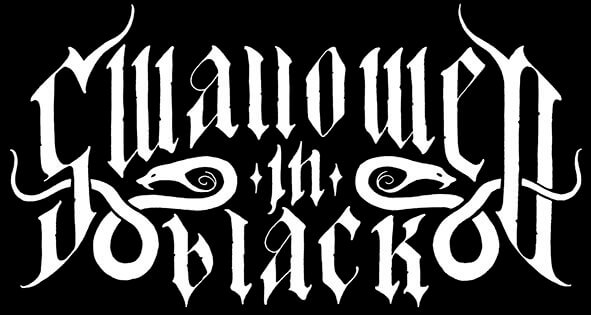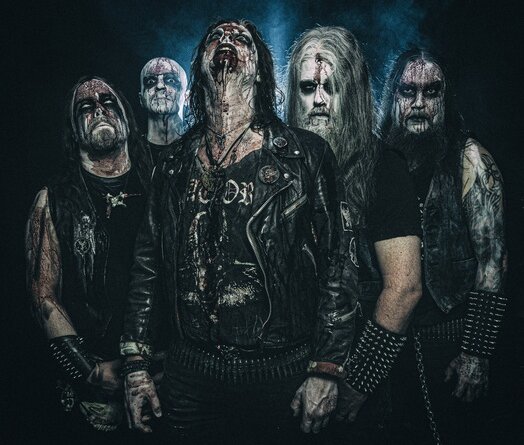“WHAT WE DO IS MORE AKIN TO A SERMON OF FIERY PRAISE AT THE MOUNTAIN OF MADNESS” – E (MALAKHIM)
Not alone antichristened with one of the most powerful, evocative and memorable album titles in the storied history of Black Metal, the second unholy full-length homily from Malakhim, ‘And In Our Hearts the Devil Sings’, also reverberates ominously across the firmament, ablaze with adversarial intent and demonstrating a delirious devotion to darkness. As the sacrilegious Swedes responsible for this profane outburst prepare to scorch the continent, one from five – lyricist / vocalist E – considers affirmed allegiances, occult orchestrations, addressing the darkness with due diligence and ordaining inspiration into an intoxicating torrent.
 The wicked-beyond-words ‘And In Our Hearts the Devil Sings’ has been unleashed upon the hollow shells who inhabit this mortal realm and the first thing that needs to be acknowledged is the authentic adversarial intent (and steadfast allegiance to the horned god of the album title) infiltrating every aspect of this profane creation – Glory Halleluiah! As well as being a rousing reaffirmation of your devotion to the devil and His deeds, is this record a poignant statement of intent from Malakhim?
The wicked-beyond-words ‘And In Our Hearts the Devil Sings’ has been unleashed upon the hollow shells who inhabit this mortal realm and the first thing that needs to be acknowledged is the authentic adversarial intent (and steadfast allegiance to the horned god of the album title) infiltrating every aspect of this profane creation – Glory Halleluiah! As well as being a rousing reaffirmation of your devotion to the devil and His deeds, is this record a poignant statement of intent from Malakhim?
“Perhaps it is – though we were already affirming any such allegiances with our earlier outputs as well. Maybe this time it came out more direct? I can’t really tell that for certain as I’ve never been someone who writes lyrics with a specific intent at first. Usually things just start with a jolt of inspiration and end up with a sentence, a word or a general idea.
“However the initial inspiration for the album title comes from the quite visceral image ‘Humans Offering Their Hearts to Satan’ by Marcel Roux, so, given how direct this is, it perhaps carried over into the creation of the album.”
Any idea where these jolts of inspiration come from? Are you digesting tomes of occult material or simply absorbing the crazy world around you, or a combination of both? Was there a singular source of inspiration for ‘And In Our Hearts the Devil Sings’ or were they legion?
“I won’t claim to be a great student of the occult – I guess I dabble a bit, but I do tend to read a lot overall. I believe that partaking in other outputs – whether it’s literature, art, movies or other media – can certainly help prod inspiration to rear its head.
“My own lyrical output is a distillate of all the influences, I suppose, however I tend to adapt it a bit to fit the music it will be paired with – there’s a different in the cadence and tonality between the lyrics of a track like ‘Hammer of Satan’ compared to say ‘The Firmament Submits’.”
“Do you not hear how the very firmament sings? It sings a multitude of songs in His glory”. From the off, the lyrics here are exquisite and evocative – superbly crafted. Once you get started, do they come to you rather easily or is huge focus, discipline and dedication required to piece them together so effectively? Not least because English is not your first language, I could imagine it potentially becoming quite a challenge…
“This varies immensely. Sometimes it’s like a dam that bursts open and it just flows naturally, sometimes I end up staring at this one line or even just this one word without any proper direction. I’ve had lyric ideas sit in a notebook for years before some final missing piece just falls into place and I end up finishing them – I’ve learnt the hard way to just note down any and all inspiration whenever it strikes.
“We’re spoiled with quite good English education here, no dubbed programs on television, and I personally prefer reading books in English if they’re not written in Swedish originally, I have this perception that the quality of translations to English are better just due to the fact that English is more widespread as a language than my own native tongue. All this helps I suppose. It’s also a balancing act, I prefer to be direct but I also do enjoy trying to add that evocative feeling with all my lyrical aspirations.”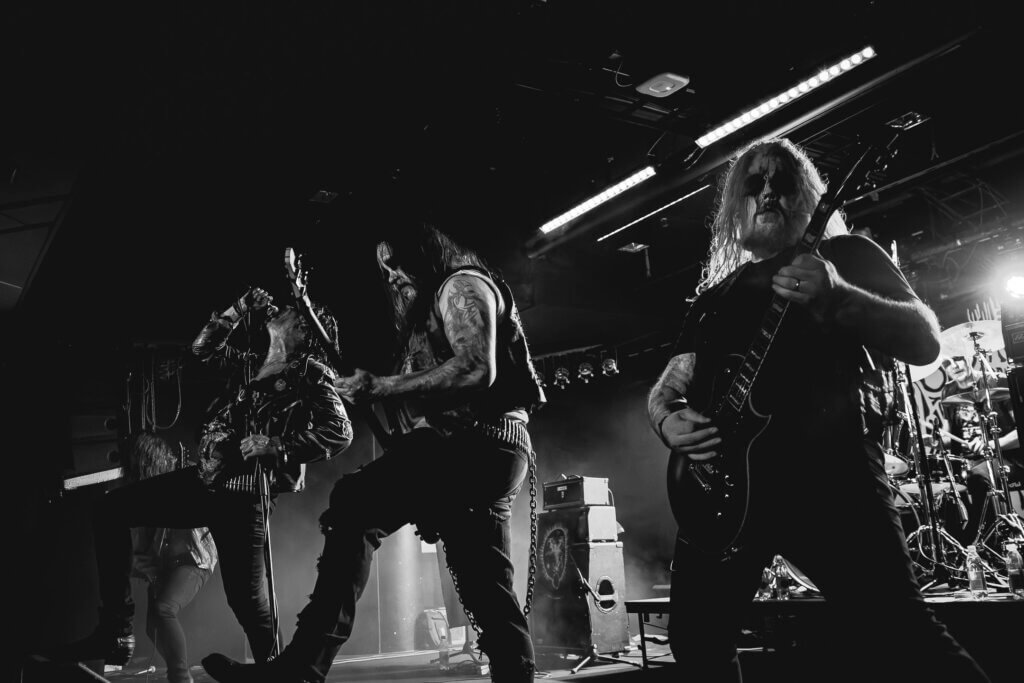 Most of the bands parading, posing and posturing these days seem to have either forgotten or never realised in the first place that in order to be truly worthy of the description, Black Metal must honour the adversary and spit upon the cross. Thus, rather shockingly, Malakhim is the exception rather than the rule, and ‘And In Our Hearts the Devil Sings’ stands apart as an all-too-rare illustration of just how underground BM should be crafted and channelled, in His name. I’m guessing that you don’t really feel like part of any ‘scene’?
Most of the bands parading, posing and posturing these days seem to have either forgotten or never realised in the first place that in order to be truly worthy of the description, Black Metal must honour the adversary and spit upon the cross. Thus, rather shockingly, Malakhim is the exception rather than the rule, and ‘And In Our Hearts the Devil Sings’ stands apart as an all-too-rare illustration of just how underground BM should be crafted and channelled, in His name. I’m guessing that you don’t really feel like part of any ‘scene’?
“The current state of what is considered Black Metal today is quite poor. However, there are several very strong bands present still within the vast ocean of mediocrity. It’s not really like those acts went away, I guess the ratios just changed where the amount of good bands or bands that feel like accurate representations of what Black Metal truly is didn’t increase as the genre became more open to the mainstream and scene tourists.
“Do we feel part of the public perception of what Black Metal is today? Not really. But then there are a lot of bands that are called Black Metal today that we’d not really consider fitting the mould. So in that sense you could argue that we consider ourselves part of a Black Metal scene, just that our definition of what that includes and excludes might differ from what a broader audience would consider it to be.”
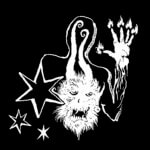 There is nothing ambiguous or indifferent about Malakhim’s approach to the dark arts. You have never deviated from your (left hand) path and the sense of continuity from ‘Theion’ to ‘And In Our Hearts the Devil Sings’ is indeed irrefutable. What faith or conviction fuels your fire to consistently create such overtly adversarial offerings? Are you using the music as a vessel to spread a particular current of darkness or is the music itself the darkness?
There is nothing ambiguous or indifferent about Malakhim’s approach to the dark arts. You have never deviated from your (left hand) path and the sense of continuity from ‘Theion’ to ‘And In Our Hearts the Devil Sings’ is indeed irrefutable. What faith or conviction fuels your fire to consistently create such overtly adversarial offerings? Are you using the music as a vessel to spread a particular current of darkness or is the music itself the darkness?
“I would certainly argue the latter. I have no interest or intent to preach or spread some form of message as part of a mission – there is no such statement of intent within the band. What we do is more akin to a sermon of fiery praise at the mountain of madness.
“It’s difficult to somehow summarize why we do what we do – we’re five individuals with differing ideas and convictions yet somehow we are all aligned and unified behind a vision of what we do as a band together and what this must be and what it cannot be. I guess these topics are better explored in person at length.”
Somehow, this music seems more relevant today than it ever did before. It doesn’t take paranormal levels of intuition to realise that humanity is languishing in the end of days. Looking at the mess we are in, is that the devil’s work or have we done this to ourselves? Or – assuming that the devil is a force that dwells inside, not just in our hearts but our minds, souls and every fibre of our essence – are these one and the same thing?
“Humanity has always strived towards survival, whatever cataclysmic event it has faced. I’m not convinced we’re at the end of days in that sense. The uprooting of certain norms and restrictions is certainly nudged on by a Luciferian spirit – something I guess we’re seeing attempts to quench these days with the resurgence of evangelism.
“The Devil certainly plays a part herein, though more as someone opening a door or showing a path. This is akin to the principles explored within the Yetzer Hara concept as well – it’s not viewed as something to be shunned completely and therein lies the beauty of these things that are neither good nor bad. It is temptation, something that leads us astray – or perhaps down the right path. As always, some will stray further into darkness than perhaps they should.”
 Into Darkness We Depart… To some (those who choose to live…) the darkness is irresistible. In a world of paradoxes and inversions, would you agree that to embrace the darkness is to see the light and that to resist temptation is to sin against the self?
Into Darkness We Depart… To some (those who choose to live…) the darkness is irresistible. In a world of paradoxes and inversions, would you agree that to embrace the darkness is to see the light and that to resist temptation is to sin against the self?
“At the very least we need to face this darkness. Whether we choose to embrace it or reject it is ultimately up to ourselves. The fear of death, the shame of lust, the suppression of emotional currents: all these things are restricting and as you put it, perhaps ‘resisting’ temptation – of course, do so with a modicum of moderation to avoid succumbing wholly to the bestial nature that is inherent in everything.
“Herein the darkness certainly represents the unknown, the vast and unforgiving sea of uncertainties that we can choose to traverse, or simply stay on the shores to avoid drowning therein.”
Casting your mind back to the very beginning of the journey that has culminated in Malakhim, can you remember which bands, albums, movies or writings ignited your passion for Black Metal music and the occult? I’ll never forget the first time I marvelled at the cover of Iron Maiden ‘The Number of the Beast’, listened to Deicide or Darkthrone, or watched the original Salem’s Lot. What were the works or acts that sent you down this path?
“I guess like most people my age it was an exploratory journey that began with discovering music in the first place and then becoming fascinated with the extreme sides. I think the first piece of music I owned myself was a mixtape which had some Twisted Sister on it that I got from a friend in school. My parents also subscribed to this ‘four tapes monthly’ thing which meant I was allowed to pick one now and then. I picked up an Ebba Grön tape there and ‘Kill ‘Em All’ just because the cover looked cool. From there we were a small bunch who explored Metallica, Guns ‘n Roses, Motörhead, etc. All these albums had already been out when I discovered them, so I didn’t get to experience that first initial cultural shock that went through Sweden over a band like WASP, but there were still some echoes of that satanic panic present within the minds of a lot of parents and adults. Headbangers Ball was still running on MTV as well so once we got cable at home that certainly accelerated things as well. The music led to exploring horror movies, Salem’s Lot like you mentioned, Rosemary’s Baby, The Omen, Warlock, Hellraiser, etc.
“From Punk and Rock to Heavy Metal and then onwards it was easy to start looking for more extremes. Morbid Angel, Mercyful Fate, Dismember, Deicide, Mayhem – I still fondly remember that first time I heard Swanö’s scream on ‘Black Horizons’ and the shivers I had from listening to ‘The Somberlain’ for the first time. And then finding likeminded people of my own age or older, that also helped.”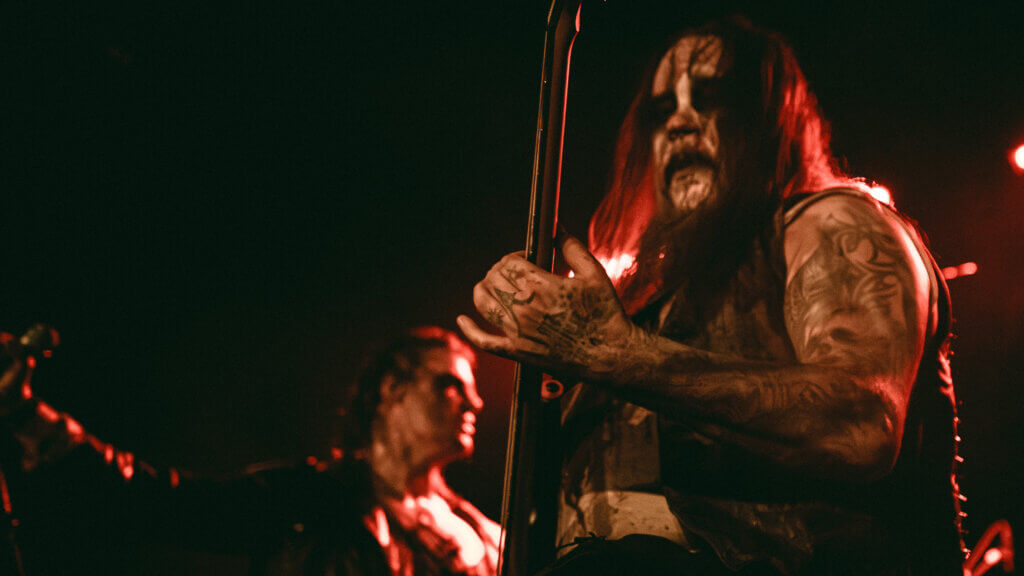 ‘And In Our Hearts the Devil Sings’ is ablaze with infectious melodies, stellar performances, masterful hymncraft and a production that allows the soaring majesty and glory to hit home with clarity and precision. While outstanding – or at least competent – musicianship should be the starting point for any Black Metal band worth its corpsepaint, unfortunately this isn’t always the case. But crafting actual ‘songs’ is evidently a major focus for Malakhim?
‘And In Our Hearts the Devil Sings’ is ablaze with infectious melodies, stellar performances, masterful hymncraft and a production that allows the soaring majesty and glory to hit home with clarity and precision. While outstanding – or at least competent – musicianship should be the starting point for any Black Metal band worth its corpsepaint, unfortunately this isn’t always the case. But crafting actual ‘songs’ is evidently a major focus for Malakhim?
“Thank you. I’m pleased that this shows. It’s certainly an important aspect for us to write songs with actual riffs – after all we play Black METAL and the roots of the genre are quite important in that sense. As important as it is to listen to the genre originators, it’s just as important to acknowledge the bands that came before them and created that fertile soil for this sonic expression to grow in – the more traditional Heavy Metal bands and, later on, Thrash Metal / Death Metal.”
The intoxicating flow, structuring and pacing of ‘And In Our Hearts the Devil Sings’ is such that the record seems to have a beginning and end in terms of both the music and the plot, climaxing in the apocalyptic, light-drowning ‘The Firmament Submits’. Is this how it was composed and delivered, with a linear or chronological story unfolding? Did you create the title track first and then expand the album / underpinning narrative (if there is one) outwards from there?
“No, not at all. Each track was composed standalone, but we spent a lot of time arranging them to ensure we had a good flow. It’s these details that I think are very important, ensuring the pacing is just right with the emotions and moods we want to tap into. I spend a lot of time obsessing over these things, not just with the music but also with the art and the general aesthetics of the releases.
“There’s not much of a storyline connecting the tracks, more of a general mood. When ‘The Firmament Submits’ was presented for the first time without any vocal arrangements, or any lyrics for that matter, it was clear to us that it was a natural closer for the album, so some tracks by default were easier to place in the running order than others.”
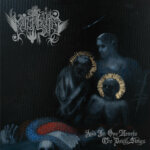 Speaking of the artwork, I don’t detect any reference in the front cover to the Marcel Roux illustration that inspired the album title. Is there any inference to Humans Offering Their Hearts to Satan, or what is the inspiration or motivation behind this K Pavleska work, which the artist herself describes as ‘a vision steeped in shadow, forged in fire’?
Speaking of the artwork, I don’t detect any reference in the front cover to the Marcel Roux illustration that inspired the album title. Is there any inference to Humans Offering Their Hearts to Satan, or what is the inspiration or motivation behind this K Pavleska work, which the artist herself describes as ‘a vision steeped in shadow, forged in fire’?
“My philosophy when it comes to cover art – or any artistic work related to the releases I’m involved in – has always been that we select the artist based on their work in the past and how well we feel their style would fit with what we’re attempting to do. I try to leave as little instruction as possible, as to us it’s important that our role is the audial interpretation and the visual side rests with the selected artist.
“Initially for this one I had some form of idea that I wanted to have something based on that drawing, however there is already such an illustration out there done by Roux so another would make no sense. We gave her access to the lyrics of the album and some preview of the material, and she then interpreted all this. It certainly captures that foreboding and threatening aura of the album and I really like the idea behind letting the artist distil the essence of the album and interpret it.”
![]() Soon you will embark on an unholy European annexation with Whoredom Rife and Halphas, including Celebrare Noctem Fest in Austria, which boasts a rather stellar lineup. What can we expect from these upcoming ceremonies and how much are you looking forward to performing the hymns from ‘And In Our Hearts the Devil Sings’ in a live environment? Is this the setting where the power, passion and adversarial resolve of Malakhim truly flourishes?
Soon you will embark on an unholy European annexation with Whoredom Rife and Halphas, including Celebrare Noctem Fest in Austria, which boasts a rather stellar lineup. What can we expect from these upcoming ceremonies and how much are you looking forward to performing the hymns from ‘And In Our Hearts the Devil Sings’ in a live environment? Is this the setting where the power, passion and adversarial resolve of Malakhim truly flourishes?
“Even when rehearsing the tracks there’s an electric feeling, something I believe we manage to transfer when playing live and that I hope will remain present during the tour as well. I think seeing the songs live, along with the tracks from our previous releases as well, will cement the unity and clarity of everything we’ve done so far.
“The setlist is varied and will feature tracks from all our releases, and yet when we’re playing them they fit together like they were from the same album. Much like how we spend time ensuring the pacing on the recordings fit, we spend time working on the live set with the same intent and purpose.
“I suppose the final question is best answered by those witnessing the performance. If we somehow can transfer the feeling we get playing the songs to the audience, we have succeeded and what you ask is true indeed. I tend to blank out just before hitting the stage, so there’s usually only fragments and bits for me to recollect what’s gone down onstage.”
Of course, Satan doesn’t pay the gas bill, rent or carbon taxes, and a tour like this will naturally have a detrimental impact on your finances, with presumably a loss of earnings almost inevitable. Is embarking on a trek like this and the cost / sacrifice incurred to take your music to the masses across the continent a sign of your devotion to this artform and dedication to the underground? Or are you secretly hoping against all hope to perhaps turn a small profit?
“Ha! Mammon certainly claims His pound of flesh for something like this. It makes no sense to release an album and not want it out there to be heard, but of course there’s a balancing act between art and work, so when we were offered this tour by our booker, Abyssal Booking, it made sense, not only to push the album but also because the band package made sense as well.
“We’ll see if this is something we do again in the future or if it becomes a rare occurrence; we certainly intend for Malakhim to be experienced in a live milieu, however there’s no intent to make this band a primary source of income. Personally I wouldn’t be able to do that, I prefer being able to do this on my own terms without any compromise, and tying it to making a living would certainly put restrictions on that quickly.”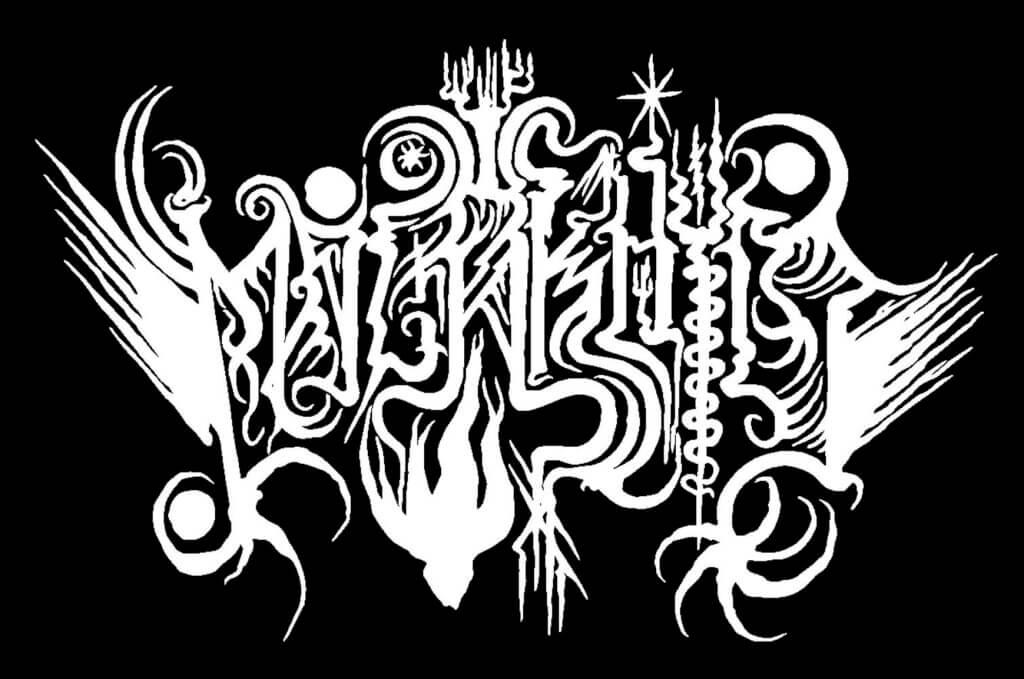
Image credits: live at Outbreak IV by E Edström; ‘And In Our Hearts the Devil Sings’ booklet illustration by Karmazid; There is a Beacon panel from ‘Theion’ by Nether Temple Design; fallen angel and staff seared from the Malakhim logo by the devil Himself
